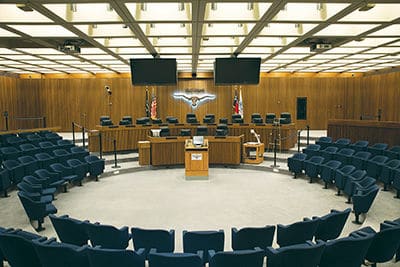ROBERT FRANCIS
rfrancis@bizpress.net
The Fort Worth City Council heard a preliminary report from an independent panel of national experts that has been reviewing Fort Worth Police Department policies during its work session meeting on Aug. 4.
Atatiana Jefferson, a 28-year-old Black woman, was fatally shot in October 2019 in her home by a white police officer. The incident damaged the trust the department had been trying to build with communities of color. Officer Aaron Dean resigned and was charged with murder after fatally shooting Jefferson through a back window of her home while responding to a call about an open front door.
Fort Worth Police Chief Ed Kraus declared there was “absolutely no excuse” for Jefferson’s killing.
The independent panel review was initiated and appointed by City Manager David Cooke following the death of Jefferson.
“Every organization can benefit from having an independent group of experts review policies and procedures to see where we can improve the work we do with, and for, our community,” Cooke said in a news release.
The issue gained additional urgency following George Floyd’s death on May 25 in Minneapolis. His death has inspired international protests and drawn new attention to the treatment of African Americans in the U.S. by police and the criminal justice system.
Fort Worth’s panel was led by Alex del Carmen and Theron L. Bowman, both experts with strong local and national ties who also have extensive police reform experience.
Bowman has been chief of police in Arlington and also served as deputy city manager for that city. Del Carmen heads up the School of Criminology, Criminal Justice and Strategic Studies at Tarleton State University in Fort Worth.
“But one issue that we noted is that while the police department has very good policies, has very good training facilities, what the officers do in practice don’t always comport with what the policy says. There is a disconnect sometimes in what happens on the street and what the policies require,” said Bowman.
Bowman said there have been conversations with the police department regarding those disconnects between policies and reality.
De-escalation is one area where the policies are good, but do not always translate to police practice in the field, he told the council.
“Police officers … when they interact and engage with members of the public [we expect] that they look to reduce the tension, that they look to deescalate the amount of force used,” said Bowman. “The de-escalation policy while very good, needs to be uniformly applied on every call on every engagement, on every interaction with members of the public where it’s possible and appropriate to do so.”
Unnecessary use of force by officers not only creates additional risk for members of the public, but also for police officers, Bowman said.
“And it also erodes the public’s confidence in the legitimacy of the department,” he said. “What research has shown that to the extent the public feels like in their interactions with the police they are treated with dignity and respect, they tend to recognize the police as legitimate authority and they tend to follow or obey the law and respect the police officer’s authority.”
Bowman said that, in doing interviews with officers, they found no “desire to use excessive force.”
“What we noted was not the officer’s desire to use excessive force, but we noted mostly systems issues – systems break down – so there are opportunities to perfect training and improve supervision and systems,” he said.
Those systems improvements would result in better outcomes on the street, he said.
The Fort Worth Police Department also struggles with community engagement, according to the group. “The department really struggles in relationships with low income communities and communities of color,” said Bowman.
“This lack of trust there goes much deeper than the highly publicized use of force incidents that we’ve seen from afar on the news. Much of this lack of trust actually stems from unnecessarily negative interactions between community members and police officers,” he said.
The group noted the tendency – sometimes at any rate – “for police officers to engage and escalate using language or verbiage that tends to be more offensive and disrespectful than deescalating,” said Bowman.
That is another area where the department’s policies and training are not translating into practice,” he said.
The group felt that completing the process of defining the roles and the responsibilities of the office of the police monitor will help improve community relations, Bowman said.
The panel’s perspective is that other cities with police monitors that are successful are “adequately resourced,” and Bowman noted that the same is “necessity here in the city of Fort Worth as well.”
The panel will continue to engage in additional document review, interviews, data analysis and community meetings in the coming months.
Fact Box:
View an executive summary: https://bit.ly/3kjj22A
View the panel’s complete preliminary report: https://bit.ly/3gyeoLV
View an executive summary and the panel’s complete preliminary report.






